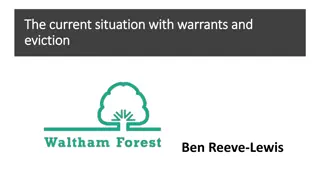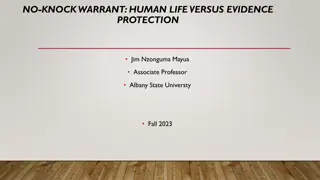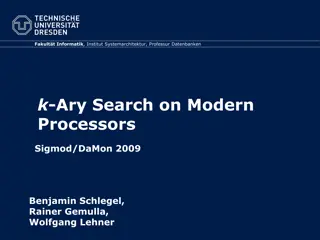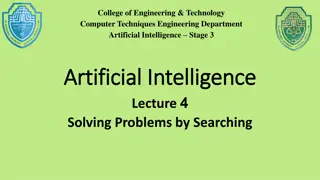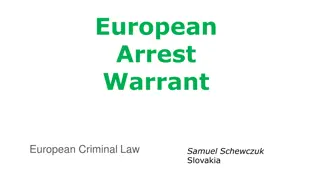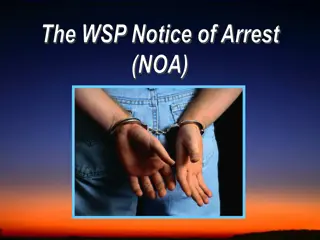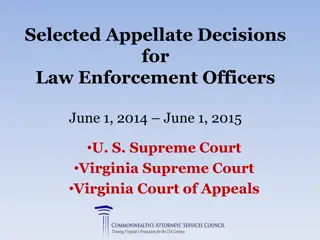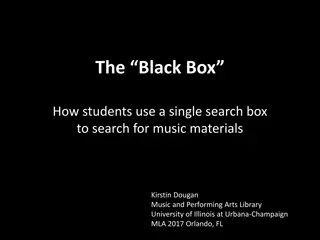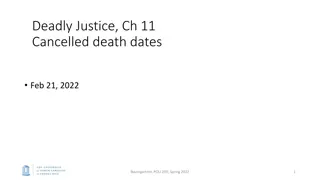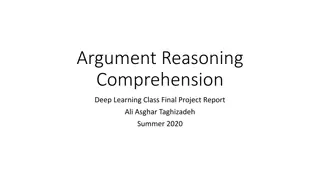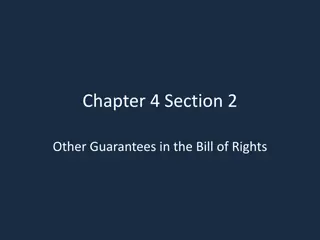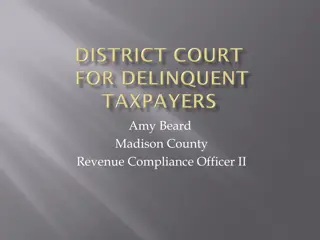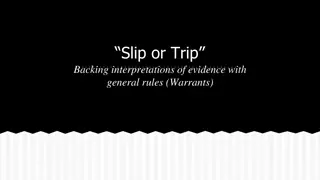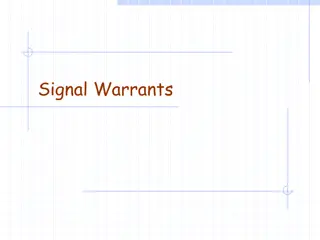Understanding Search Procedures and Warrants in Legal Context
Search procedures play a crucial role in law enforcement, allowing authorities to explore, probe, and seek out hidden or suspected items. This comprehensive outline covers the meaning of search, locations where searches are conducted, objects searched for, legal definitions of search of a place, search warrants, searches by magistrates, and key considerations during a search process. It also touches on seizure, planting of evidence, and the importance of reasonableness in searches.
Download Presentation

Please find below an Image/Link to download the presentation.
The content on the website is provided AS IS for your information and personal use only. It may not be sold, licensed, or shared on other websites without obtaining consent from the author. Download presentation by click this link. If you encounter any issues during the download, it is possible that the publisher has removed the file from their server.
E N D
Presentation Transcript
Introduction: Search is an effective tool in the hands of the authority and at the same time, it constitutes a serious invasion on the liberty of a person. Search- its meaning: Looking for Exploration Probing To seek out To penetrate Search implies an exploratory examination or probing into or seeking out something which is hidden, suspected or not open, exposed or demonstrated.
Search-Where? House, building and premises Person Vehicle Vessel Search-What for? Discovery of contraband article or illicit goods or stolen property. Documents-which may be relevant or incriminating in any form. Evidence of guilts. Search of a person-Its Objects: (Section 51 Cr.PC and Section 100 (3) Cr.PC) To find incriminating articles. To seize offensive weapon (Sec.52 Cr.P.C) To look for any other thing which may be useful for investigation-Marks of injuries on his person.
Search of a Place-What it is ? Defined in Sec. 2 (P) Cr.PC. Place includes: House Building Tent Vehicle Vessel Relevant Section of Law: Search of a place entered by a person sought to be arrested-Sec. 47 Cr.PC. Without warrant, for investgation-sec. 165 Cr.PC Search under warrant issued by the court. For production of certain document or thing. (S-93) Place, suspected to contain stolen property etc. (S-94) For publications forfeited by the Government. (Sec-95) Recovery of persons wrongfully confined. (sec.97) Restoration of abducted females. (Sec. 98) Document or thing in postal custody. (S-92)
Search warrant-What It is ? A search warrant is warrant issued by a Court for the search of a place to be executed in the same way as a warrant for arrest of a person (Sec.99), subject to the special sageguards provided in Section 100 Cr.PC. Simply speaking, it is an authority given by a competent public servant to search a place for any thing or person. Note: Issuing a search warrant by an Executive or Judicial Magistrate is a judicial act.
Search by Magistate in his presence: (section 103 Cr.PC) Any Magistrate (Judicial or Executive) is empowered to direct search to be made In his presence. Of any place. For the search of which he is competent to issue a search warrant. Seizure The act of taking possession of property for violation of law contrary to the wishes of the owner. Planting: Placing of any inciminating article by the law enforcement officer in the place to be searched and showing a search before witnesses according to all formalities.
Points to be Borne in Mind in the Context of Search: Reasonableness of the search. Time likely to be taken in conducting the search. Likelihood of the incriminatory property being destroyed. Calling upon two witnesses. Must be in presence of witnesses. Preparation of search list. The occupants to attend search. Disclosure of identity by Public Servants making the search. Showing of the authorisation. Woman-by a woman-decency and decorum to be observed. Public Servants called to constitute a search party should be tight-lipped. Members of the Search Party should organise themselves effectively. They should offer themselves to be searched. One or two members of the Search Party should keep an watch over the members of the search party. After entry, no outsider, except medical officer or legal practitioner, should be called at the request of the party. Search Party should take control of the telephone, if any. Members of the Search Party should be cool, polite and courteous.
Elements of Search: Three S : It should be Sudden , Surprise & Swift It should have Authencity , Secrecy & Co-ordination . What Search Party should Carry? Authorisation. Search material, Panchnama forms, blank papers, carbons, pins, tags etc. Valid Identity Cards. Seals. Pen, Pencil etc. Organize effectively / call witnesses / offer yourself for search, before and also after search (at the point of entry and also at the point of exit).
Enactments under which Searches may be conducted by persons authorised to do so: Arms Act. Essential Commodities Act. Opium Act. Excise Act (State). Income Tax Act. Customs Act. State Gambling Act. Motor Vehicles Act. Prevention of Food Adulteration Act. Prevention of Corruption Act. Code of Criminal Procedure. Prevention of Immoral Traffic Act. The Dramatic Performance Act. Gold Control Act.
Irregularity in Search: Does not vitiate seizure of articles. Cannot vitiate trial or conviction unless accused has been prejudiced. It casts a duty upon the Court to Scrutinize evidence carefully. It may affect the weight of evidence. (vide Section-S.465 Cr.PC) Law relating to Search at Glance: Search Warrants: Sec-93 Cr.PC General Search Sec-94 Cr.PC Stolen Property / Forged Documents. Sec-95 Cr.PC Forfeited Publications. Sec-97 Cr.PC Wrongfully Confined Persons. Sec-98 Cr.PC Restoration of abducted females. Search Without Warrants: Magistarate Police Officer (O/C) Sec: 165, 166, 153 Cr.PC. 103 Cr.PC
Search Procedure: Sec 47 Cr.P.C Sec 100 Cr.P.C Sec 165 Cr.P.C Search of a Person: Sec 51 Cr.P.C. Sec 52 Cr.P.C Power of Police to Seize without Warrant: Sec 102 Cr.P.C.




